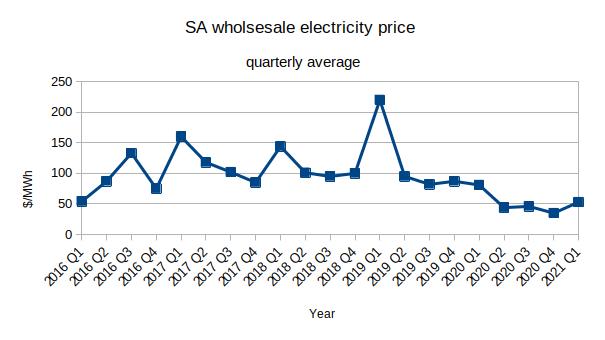ACT government subsidising energy price increases that they legislated into existence
Posted by Luke on the
Filed under economics, politics
Canstar recently reported that power bills in the ACT are set to increase by more than $200 annually. Expectedly, this is being labelled a "price hike" in order to lay the blame at the feet of the energy provider (EvoEnergy is the primary provider of ACT's power). As the ABC notes, the price increase is quite unexpected due to the relatively low wholesale energy prices. The 2020/2021 spot prices for wholesale energy are at about 2016 levels currently (see below).
So, why are these low wholesale prices not being reflected in the ACT market? It is due to market interference by the ACT government. Whereas other suppliers would change the retail price per kWh to track the wholesale spot market, the legislators are forcing EvoEnergy to abide by long-term fixed-price contracts negotiated by the government. You can almost guarantee this type of deal would not happen in the free market, as most successful companies understand risk forecasting very well. In times of high energy costs (such as in early 2019), this may have been beneficial, however, now that we're at relative lows, EvoEnergy must pay excess to cover the shortfall. EvoEnergy expects payments under these fixed-cost contracts to more than triple from $42 million this financial year to $127 million in FY2021-22. The primary reason for the government interference in the energy sector is the ACT's push for 100% renewable energy (which they purportedly achieved in late 2020). Typically, this claim of 100% renewable energy is sleight of hand, as the electricity supply that powers the ACT is still non-renewable, they simply offset their energy usage using solar and wind farms. It's fortunate they don't depend on these particular renewable sources of power as their primary grid.
California proved during their 2020 summer season that solar and wind don't scale well to high demand. Their rush to shut down their nuclear and coal power plants resulted in a vulnerable grid. Solar and wind in particular are vulnerable because they have to be in ideal conditions to effectively produce power. As the sun went down, on those hot summer nights, Californians turned on their air conditioners only to find that their solar network doesn't work particularly well without a shining sun! To compensate for the shortfall in production, they had to increase the output of their coal power plants. A resilient power network surely can't be one that falls apart on the first overcast, still day. China understands this problem well. They are planning to build six to eight new nuclear reactors per year between 2020 and 2025 (which would make them the largest producer of nuclear energy by 2022, surpassing America and France).
Back to the ACT, where the renewables are a secondary part of the grid, offsetting the emissions of the primary (non-renewable) part of the grid. A fully renewable, reliable grid is not achievable without nuclear (with today's technology, that is), so the ACT has to double-dip to give the appearance of a fully renewable grid. What this means for consumers is that they have to pay for the non-renewable AND the renewable portion of the electricity.
So, what is the government doing to remediate the issue they've caused? Will they allow the company to negotiate their pricing contracts themselves? Or perhaps walk back their 100% renewables requirement? Or perhaps they'll even invest in nuclear? If you answered "none of the above", you'd be correct. Instead, the government will increase electricity concessions by $50 (up to $750) annually this financial year, and a further $50 (up to $800) next financial year. The concession represents a $24.8 million dollar annual expense for the government, in addition to the one-off $1 million investment going to the "utilities hardship fund". That's like pushing someone overboard and then applauding yourself when you throw them a life jacket. You still pushed the poor bastard in the water but at least the TV crew was there to watch you rescue him.
It's the typical cycle of well-intentioned legislation:
- government introduces legislation that makes it more expensive to do business
- companies raise their prices in turn
- news media and the government link arms to condemn the evil price-gouging practices of the companies
- government offers a lifeline in the form of tax rebates
The end result is always the same. The biggest losers are the low-income consumers who now have to spend more of their income for the same service. The government spends more (likely via deficit spending), and they likely makes less from taxation. You may imagine that the company is doing well, after all, they've raised their prices, therefore they must be making more money. That is not the case. The best way to make money as a business is to make your goods and services more affordable, and therefore allow more people to buy. As a result of these price increases, people will change their behaviour to use less power. They'll put on an extra pair of socks, and drink their tea a little hotter this winter. Perhaps they'll install a wood stove to heat their home without using electricity. The government doesn't even benefit, apart from their PR victory in this instance, everyone is worse off when they have to pay for the moral hazard of well-intentioned legislation.
